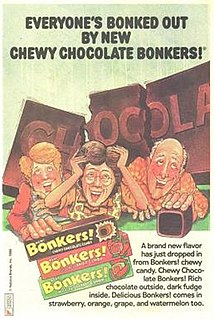
Kleenex is a brand name for a variety of paper-based products such as facial tissue, bathroom tissue, paper towels, tampons, and diapers. Often used informally as a genericized trademark for facial tissue in the United States, the name Kleenex is a registered trademark of Kimberly-Clark Worldwide, Inc. Kleenex products are manufactured in 30 countries and sold in more than 170 countries. Kleenex brands include Cottonelle, Huggies, and VIVA.

Yippy is a metasearch engine that groups search results into clusters. It was originally developed and released by Vivísimo in 2004 under the name Clusty, before Vivisimo was later acquired by IBM and Yippy was sold in 2010 to a company now called Yippy, Inc. At the time, the website received 100,000 unique visitors a month.
Quasar is an American brand of electronics, first used by Motorola in 1967 for a model line of transistorized color televisions. These TVs were marketed as containing all serviceable parts in a drawer beside the picture tube. It was then established as a subsidiary brand, with all Motorola-manufactured televisions being sold as Quasar by Motorola. Motorola sold its television business to Matsushita Electric, now Panasonic, in 1974 who continued producing and marketing televisions under the Quasar brand until 2005. In 2013 Panasonic re-registered the Quasar trademark.

1-Click, also called one-click or one-click buying, is the technique of allowing customers to make purchases with the payment information needed to complete the purchase having been entered by the user previously. More particularly, it allows an online shopper using an Internet marketplace to purchase an item without having to use shopping cart software. Instead of manually inputting billing and shipping information for a purchase, a user can use one-click buying to use a predefined address and credit card number to purchase one or more items. Since the expiration of Amazon's patent, there has been an advent of checkout experience platforms, such as PeachPay, Fast, and Bolt, which are democratizing similar one-click checkout flows.

The Fresh Market is an American chain of gourmet supermarkets based in Greensboro, North Carolina.

Modelling clay is any of a group of malleable substances used in building and sculpting. The material compositions and production processes vary considerably.

Bonkers was a candy offering from Nabisco in the mid-1980s. It consisted of chewable rectangular-shaped candies with tangy filling. The candy came in a large rectangular package with several of them individually wrapped. Common flavors included grape, orange, strawberry, watermelon and chocolate.

In the field of photographic imaging, a photographic mosaic, also known under the term Photomosaic, is a picture that has been divided into tiled sections, each of which is replaced with another photograph that matches the target photo. When viewed at low magnifications, the individual pixels appear as the primary image, while close examination reveals that the image is in fact made up of many hundreds or thousands of smaller images. Most of the time they are a computer-created type of montage.
Sher-Wood Hockey Inc. is a Canadian manufacturing company of ice hockey equipment. Sher-Wood also produced equipment under the Chimo brand name from 1977 to 1986. Since 2008, it has been the official supplier of game pucks to the NHL, taking over those duties upon its purchase of InGlasCo, which had served in that capacity prior to its purchase by Sher-Wood.
In United States trademark law, the functionality doctrine prevents manufacturers from protecting specific features of a product by means of trademark law. There are two branches of the functionality doctrine: utilitarian functionality and aesthetic functionality. The rationale behind functionality doctrine is that product markets would not be truly competitive if newcomers could not make a product with a feature that consumers demand. Utilitarian functionality provides grounds to deny federal trademark protection to product features which do something useful. Patent law, not trademark, protects useful processes, machines, and material inventions. Patented designs are presumed to be functional until proven otherwise. Aesthetic functionality provides grounds to deny trademark protection to design features which are included to make the product more aesthetically appealing and commercially desirable. Aesthetic features are within the purview of copyright law, which provides protection to creative and original works of authorship.

Nesbitt's is a brand of orange-flavored soft drink sold in the United States. Nesbitt's was originally produced by the Nesbitt Fruit Products Company of Los Angeles, California. The company also produced several other flavors of soft drink under the Nesbitt's brand and other brand names, including Nesbitt's grape, strawberry and peach-flavored sodas.
Trademark distinctiveness is an important concept in the law governing trademarks and service marks. A trademark may be eligible for registration, or registrable, if it performs the essential trademark function, and has distinctive character. Registrability can be understood as a continuum, with "inherently distinctive" marks at one end, "generic" and "descriptive" marks with no distinctive character at the other end, and "suggestive" and "arbitrary" marks lying between these two points. "Descriptive" marks must acquire distinctiveness through secondary meaning—consumers have come to recognize the mark as a source indicator—to be protectable. "Generic" terms are used to refer to the product or service itself and cannot be used as trademarks.
Edge Games, Inc. is an American video game developer and publisher headquartered in Pasadena, California, best known for the practices of its founder and chief executive officer, Tim Langdell, in enforcing trademarks relating to the word "edge", which sources have described as "litigious". Langdell has defended these practices, stating that Edge has only sued two companies since the late 1980s.

A trademark is a type of intellectual property consisting of a recognizable sign, design, or expression which identifies products or services of a particular source from those of others, although trademarks used to identify services are usually called service marks. The trademark owner can be an individual, business organization, or any legal entity. A trademark may be located on a package, a label, a voucher, or on the product itself. For the sake of corporate identity, trademarks are often displayed on company buildings. It is legally recognized as a type of intellectual property.
Channellock is an American company that produces hand tools. It is best known for its pliers—the company manufactures more than 140 types of pliers—particularly its eponymous style of tongue-and-groove, slip-joint pliers. Its pliers have distinctive sky-blue handle grips; the company has been using the same trademarked shade of blue since 1956.

Nisshin Seifun Group Inc. is a Japanese company based in Tokyo with overseas operations. Nisshin Seifun is listed on the Nikkei 225.
Trademark infringement is a violation of the exclusive rights attached to a trademark without the authorization of the trademark owner or any licensees. Infringement may occur when one party, the "infringer", uses a trademark which is identical or confusingly similar to a trademark owned by another party, in relation to products or services which are identical or similar to the products or services which the registration covers. An owner of a trademark may commence civil legal proceedings against a party which infringes its registered trademark. In the United States, the Trademark Counterfeiting Act of 1984 criminalized the intentional trade in counterfeit goods and services.

Marvelous Inc. is a Japanese video game developer and publisher, and anime producer. The company was formed in October 2011 by the merger of the original Marvelous Entertainment, AQ Interactive, and Liveware.
Moseley v. V Secret Catalogue, Inc., 537 U.S. 418 (2003), is a decision by the Supreme Court of the United States holding that, under the Lanham Act, a claim of trademark dilution requires proof of actual dilution. This decision was later superseded by the Trademark Dilution Revision Act of 2006 (TDRA).
ImageSource is a software and system integrations firm, specializing in Enterprise Content Management. After years of providing integration services, ImageSource developed their own line of enterprise content management (ECM) tools, based on principles of speed, ease of use, and flexibility. Their main areas of focus include capture, workflow, content management, and eForms.











